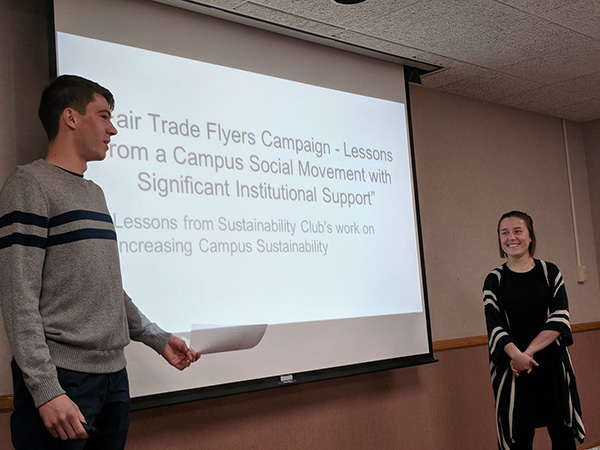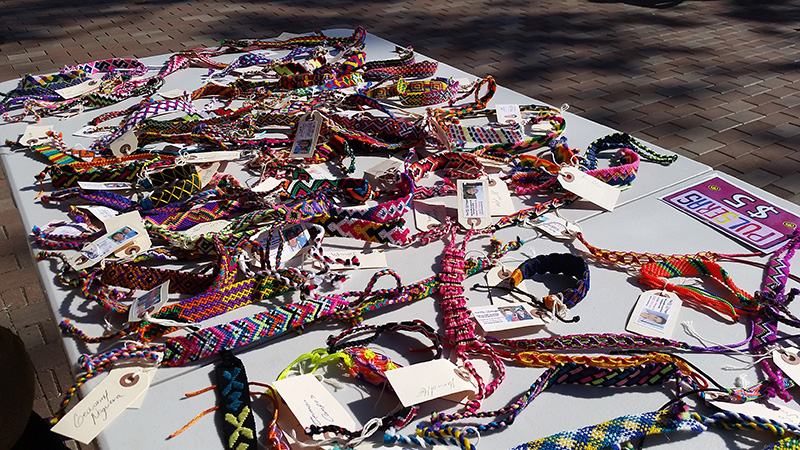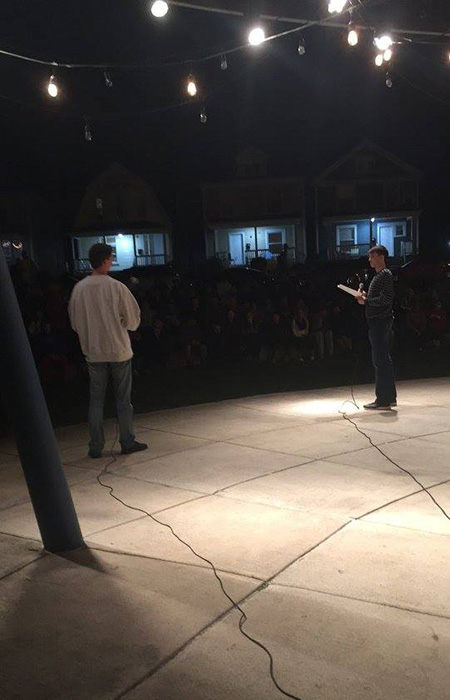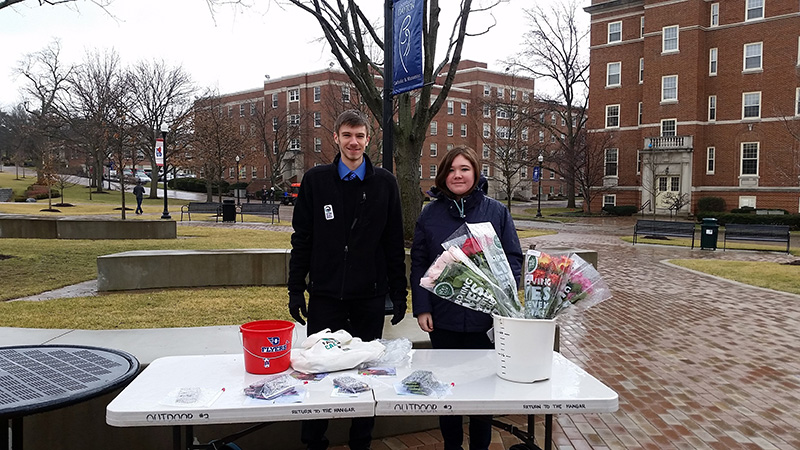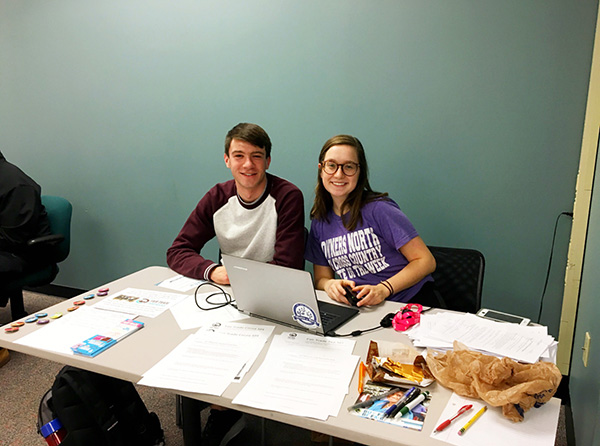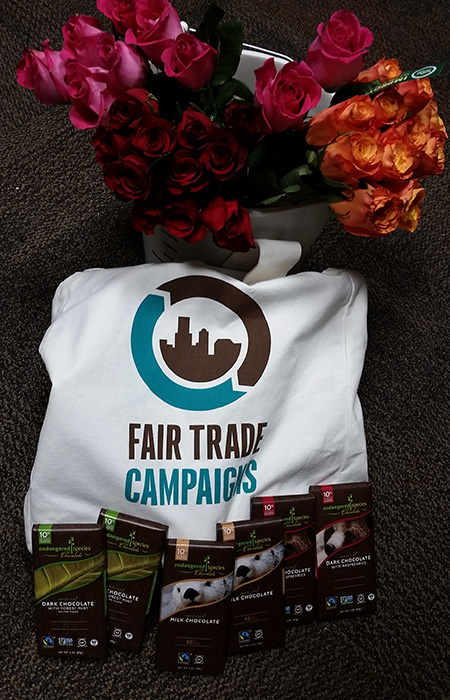College of Arts and Sciences Newsroom
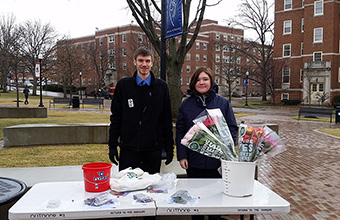
National Fair Trade Leader
What started as a petition to replace a well-known chocolate company on campus, turned into service for a national committee.
Senior Bradley Petrella is representing the University of Dayton on several national stages. He was invited to serve on the National Student Leadership Committee for Fair Trade Campaigns and is serving as a Dayton Ambassador to the National Planning Committee for the Impact Conference, an event to engage students in service, activism, politics and advocacy, which will be held on campus March 1-4.
Petrella, an international studies and Spanish major from Hilliard, Ohio, stood out to the National Student Leadership Committee because he guided the Fair Trade group on campus to complete the steps to becoming a Fair Trade University in just six months and the campaign has remained stable for two years.
“I think fair trade goes along with the mission and values we have as a Catholic university,” Petrella said.
Petrella joined a petition to have Fair Trade chocolate on campus during his sophomore year because there is a likelihood that child labor is involved in harvesting the cocoa used by big chocolate companies. He had a meeting with former University President Daniel J. Curran, who was supportive of the petition’s goal and thought starting a campaign to become a Fair Trade University would be the best approach.
From there, Curran formed a group to get the Fair Trade Campaign started. Petrella became the lead organizer of the fair trade campaign during his sophomore year.
To start the campaign, London Coe, the owner of a fair trade store in downtown Dayton called Peace on Fifth, gave a talk at the University.
Petrella had phone conferences with the national organizer for Fair Trade Campaigns multiple times a semester to discuss the goals and accomplishments of the University’s Fair Trade group.
“Fair trade really ties into so many issues that people care about,” Petrella said
Fair trade is about equitable trading partnerships that create economic development allowing producers, farmers and artisans around the world to have a good livelihood to support themselves and bring themselves out of poverty. The principles of fair trade include environmental standards, no child labor and no forced labor.
“With all these different principles, I think a lot of people can find something they care about,” Petrella said. “So if you care about human trafficking, that’s a tie-in; if you care about environmental sustainability, that is a tie-in. Fair trade also ensures gender equity.”
Becoming a Fair Trade University has five requirements: Having an established group; having fair trade items in offices or meetings on campus; getting two fair trade products in each outlet, which includes the bookstore, dining halls and cafes; education events throughout the year; and a Fair Trade resolution signed by the university president.
"Bradley has taken amazing initiative on campus to spearhead a committee of mostly faculty and administrators to explore more fair and ethical sources for the food and other goods we sell on campus,” said Nick Cardilino, associate director of Campus Ministry. “His initiative led UD to set the record for becoming the quickest university of its size to receive the Fair Trade designation.
“I'm very glad that his work and his passion has been recognized by this national fair trade organization,” Cardilino continued. “He deserves all the credit he gets for his initiative, his hard work and his passion for social justice.”
Since the campaign started two years ago, the Fair Trade Campaign at the University has been highly successful. The New Abolitionist Movement club on campus held a fair trade fashion show with the fair trade spirit wear now sold at the bookstore; held a Valentine’s Day fundraiser with fair trade flowers and chocolates; and sold fair trade bracelets made by artisans from Central America.
The UD Bookstore has the biggest selection of fair trade merchandise on campus, including chocolates, scarves, jewelry, notebooks, mugs and spirit wear made by workers in the Dominican Republic, who are paid a living wage, over three times the minimum wage there.
In the dining halls and coffee shops on campus, there are Fair Trade tea and sugar packets and ethically sourced coffee.
“Our campaign was successful quickly, we kept it going and I am passionate about it,” Petrella said. “For the mission that we have as a university, it’s important for us to support this and really be a leader in building this movement.”
In the future, Petrella hopes to continue to integrate fair trade and sustainability work into other organizations on campus, and partnerships between the University’s Human Rights Center and Hanley Sustainability Institute are already in the works. Petrella and a leader from the Sustainability Club will be presenting at the Fair Trade Campaigns 2018 National Conference on March 23-25 in Georgetown, Washington D.C. to talk about their efforts.
To get involved with the UD Fair Trade Campaign, email the Human Rights Center at hrc@udayton.edu. For more info about fair trade in general, visit the Fair Trade Campaigns website and the Fair World Project website.
- Clare Gallagher ‘18

